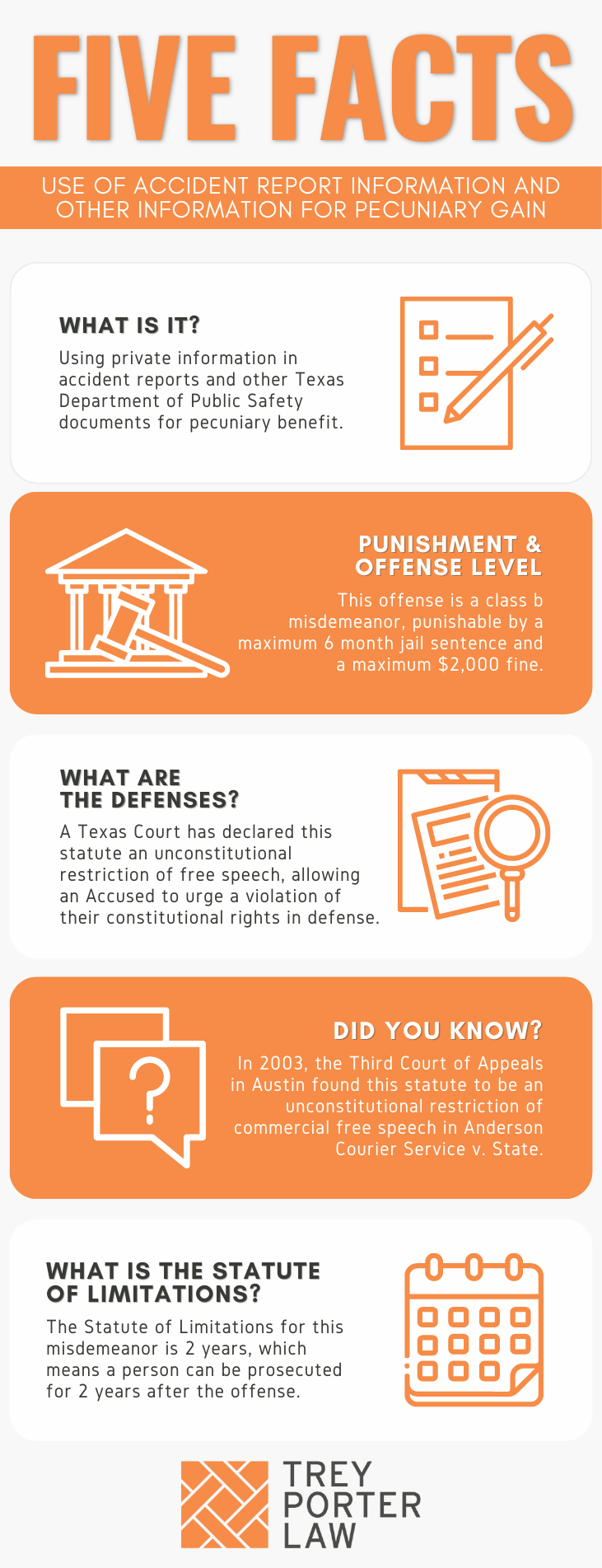WHAT IS USE OF ACCIDENT REPORT INFORMATION AND OTHER INFORMATION FOR PECUNIARY GAIN IN TEXAS?
Texas law prohibits using private information on accident reports and other documents kept by the Department of Public Safety for pecuniary gain.

WHAT IS THE USE OF ACCIDENT REPORT INFORMATION AND OTHER INFORMATION FOR PECUNIARY GAIN LAW IN TEXAS?
Tex. Penal Code § 38.18. USE OF ACCIDENT REPORT INFORMATION AND OTHER INFORMATION FOR PECUNIARY GAIN.
(a) This section applies to:
(1) information described by Section 550.065(a), Transportation Code;
(2) information reported under Chapter 772, Health and Safety Code, other than information that is confidential under that chapter; and
(3) information contained in a dispatch log, a towing record, or a record of a 9-1-1 service provider, other than information that is confidential under Chapter 772, Health and Safety Code.
(b) A person commits an offense if:
(1) the person obtains information described by Subsection (a) from the Department of Public Safety of the State of Texas or other governmental entity; and
(2) the information is subsequently used for the direct solicitation of business or employment for pecuniary gain by:
(A) the person;
(B) an agent or employee of the person; or
(C) the person on whose behalf the information was requested.
(c) A person who employs or engages another to obtain information described by Subsection (a) from the Department of Public Safety or other governmental entity commits an offense if the person subsequently uses the information for direct solicitation of business or employment for pecuniary gain.
(d) An offense under this section is a Class B misdemeanor.
WHAT IS THE PENALTY CLASS FOR USE OF ACCIDENT REPORT INFORMATION AND OTHER INFORMATION FOR PECUNIARY GAIN IN TEXAS?
Use of accident report information and other information for pecuniary gain is a Class B misdemeanor, punishable by up to 180 days in county jail.
WHAT IS THE PUNISHMENT RANGE FOR USE OF ACCIDENT REPORT INFORMATION AND OTHER INFORMATION FOR PECUNIARY GAIN IN TEXAS?
Use of accident report information and other information for pecuniary gain, a Class B misdemeanor, carries up to 180 days in jail, and a maximum fine of $2,000.
WHAT ARE THE PENALTIES FOR USE OF ACCIDENT REPORT INFORMATION AND OTHER INFORMATION FOR PECUNIARY GAIN IN TEXAS?
A person charged with using accident report information or other information for pecuniary gain may be eligible for probation after a conviction, or deferred adjudication without a conviction, for a period of up to two years.
WHAT ARE THE DEFENSES TO USE OF ACCIDENT REPORT INFORMATION AND OTHER INFORMATION FOR PECUNIARY GAIN IN TEXAS?
In 2003, the Third Court of Appeals declared this statute unconstitutional as regulating commercial free speech. See Anderson Courier Service v. State, 104 S.W.3d 121 (Tex. App—Austin 2003, pet. denied). Anyone charged with using information from an accident report or other information for pecuniary gain may assert their constitutional right to freedom of speech, and will likely be successful.
WHAT IS THE STATUTE OF LIMITATIONS FOR USE OF ACCIDENT REPORT INFORMATION AND OTHER INFORMATION FOR PECUNIARY GAIN IN TEXAS?
The limitation period for use of accident report information or other information for pecuniary gain, a Class B misdemeanor, is two years.
USE OF ACCIDENT REPORT INFORMATION AND OTHER INFORMATION FOR PECUNIARY GAIN IN TEXAS
By punishing the use of accident report information and other information for pecuniary gain, the Texas legislature attempted to protect the privacy of individuals while making public records accessible. Here, however, the regulation unreasonably restricted constitutionally protected commercial speech. In practice, people who pay for DPS records to use for pecuniary gain are not prosecuted under this statute. Instead, certain personal information in accident reports is redacted prior to their release.
TEXAS USE OF ACCIDENT REPORT INFORMATION AND OTHER INFORMATION FOR PECUNIARY GAIN COURT CASES
The case law regarding use of accident report information and other information for pecuniary gain explains the unconstitutional restriction on commercial speech.
In 2003, the Third Court of Appeals in Austin declared this statute unconstitutional, because it regulated commercial free speech as applied. Private businesses sold accident reports to a variety of companies, such as chiropractors, who use the reports to solicit clients. In this case, while the Texas legislature attempted to protect accident victims from exploitation, the regulation of use on legally obtained information did not directly advance State interests, nor was it narrowly tailored to accomplish those goals. Anderson Courier Service v. State, 104 S.W.3d 121 (Tex. App—Austin 2003, pet. denied).
Instead of rewriting the statute in the Penal Code, the legislature amended various provisions of the Transportation Code to prohibit law enforcement agencies from releasing certain personal information of people involved in accidents. See, e.g., Tex. Transp. Code § 550.065(c-1).
















